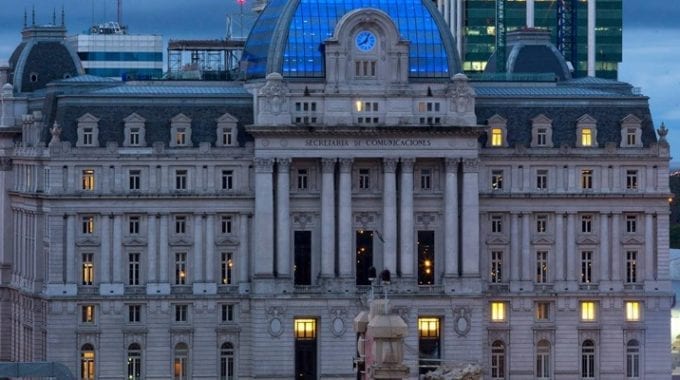If you’re in Buenos Aires and looking for free cultural events which appeal to locals and visitors alike, look no further than into the Centro Cultural Kirchner (CCK).
This week I took a chance and went along to one of their free jazz performances, and it was an inspiring experience which I would recommend to anybody in the city. The space is wheelchair accessible and runs lots of free events every day of the week. My experience there was one that I won’t forget in a hurry, and I learned a few things that I will share with you.
Jazz has usually tended to intimidate me. It has always seemed to me to be the domain of serious (mostly) men with tastes which are sometimes inexplicable to me. I admit that I can’t always tell the difference between good jazz and lift music.
So when I hurried into the CCK (horrifyingly a full 15 minutes late!) to listen to a free lunchtime jazz concert, I was pretty nervous.
I needn’t have worried. Whilst the CCK building is imposing, the staff are friendly and helpful. They even tolerated my terrible tourist-level Spanish as I asked for tickets.
Learning point 1:
Tickets to most events at CCK are free, and freely available right up to the last moment there.
My friends and I were quickly shown upstairs, and we soon found ourselves in the Salon de Honor, where we were met with an atmosphere of warmth. The building is imposing and beautiful, and this room was no exception: ornate and wood panelled. It’s lit by large elegant windows, with views of the ‘pink house’, and by clusters of orange gold lightbulbs above. But it was the music, and the people listening to this music which really swept away my fears about listening to jazz.
The room was about half filled with people, and the rest of the space was entirely full of the music. The performance attracted a diverse crowd: couples with teenage daughters, pony-tailed hippies with healthy snacks, top knotted hipsters in tartan. People arrived and left discretely and stood up to film the performance, or just to get a better view. The men in front of me hugged one another warmly when they met up. This was not the stuffy atmosphere I had expected. The people I expect to listen to jazz – older men who nod appreciatively and knowingly with their eyes closed (so that you never know if they’re napping!) – were in the minority.
At one quieter moment an older man, who looked like these typical jazz experts, sat up to loudly applaud … before the music was over. For the rest of the performance he smiled at us and pulled hilariously exaggerated embarrassed faces. Which leads me to…
Learning point 2:
In this cultural city, it is not only the typical snobs and experts who will come to listen to live jazz in a room filled with music.
The audience, and the surroundings were welcoming, but I was still afraid of the performers giving me a disapproving glance. After all we were clearly tourists, clearly not the typical jazz experts, and very clearly late. But the reality was quite the opposite.
Between songs the Supertrio actually shared chat and banter with the crowd. My touristy Spanish wasn’t quite up to all of their jokes, but the band’s friendliness certainly contributed to the warmth and laughter of the atmosphere.
And what about the music?
Oscar Giunto and his Supertrio (with Oscar Giunta thundering on the drums, Hernán Jacinto grooving on the piano and Arturo Puertas boogying on the bass) were interpreting the music of some of the great classic jazz composers. The performers may have been playful between the pieces, but were entranced and entrancing when they played the music – moving from pensive to energetic in a heartbeat.
Oscar Giunta was born into a musical family (he is the son of the bassist and pianist Oscar Giunta sr., and the singer Liliana Parafioriti), and in 1999 he co-founded the Urban Quintet – one of the most iconic new jazz groups in Argentina. But even though he is up there with jazz royalty, he has actually spoken about against all the snobbery and pretentiousness surrounding jazz. In an interview with Mariana Guzzante for Los Andes, Giunta said that he wanted to look outside the ‘pseudo-intellectual’ approach which so many people have to jazz.
Being there, listening the music was quite an experience. The music gave me space and time to think creatively and fully. I have so many mindfulness apps on my phone, but this was the real deal: sitting in a beautiful space, in a warm environment and listening to wonderfully meandering music. And it was free!
Learning point 3:
This music is gooood. Once I’d been helped past the initial anxiety and awkwardness of approaching big old scary jazz, I started realising what all the fuss is about. It’s brilliant.
So, whether you’re a jazz snob or a nervous newbie, I would highly recommend taking yourself along to some of the free gigs and concerts at CCK.
This week alone there are free tickets to hear the jazz of Barry Harris (Saturday 21 October, 8pm – Symphony Hall), and the music of the Buenos Aires Philarmonic Orchestra (Thursday October 19, 8 pm – Symphony Hall), as well as many other performances and classes.
I recommend that you face your fears of music snobs, and let yourself go and listen to the music you want to, with the CCK as an accessible (and free!) starting point.
Full listings are available at http://www.cck.gob.ar/
For more information about Jazz other cultural events contact Vamos Spanish Academy or enter https://vamospanish.com Viamonte 1516, CABA, Argentina




